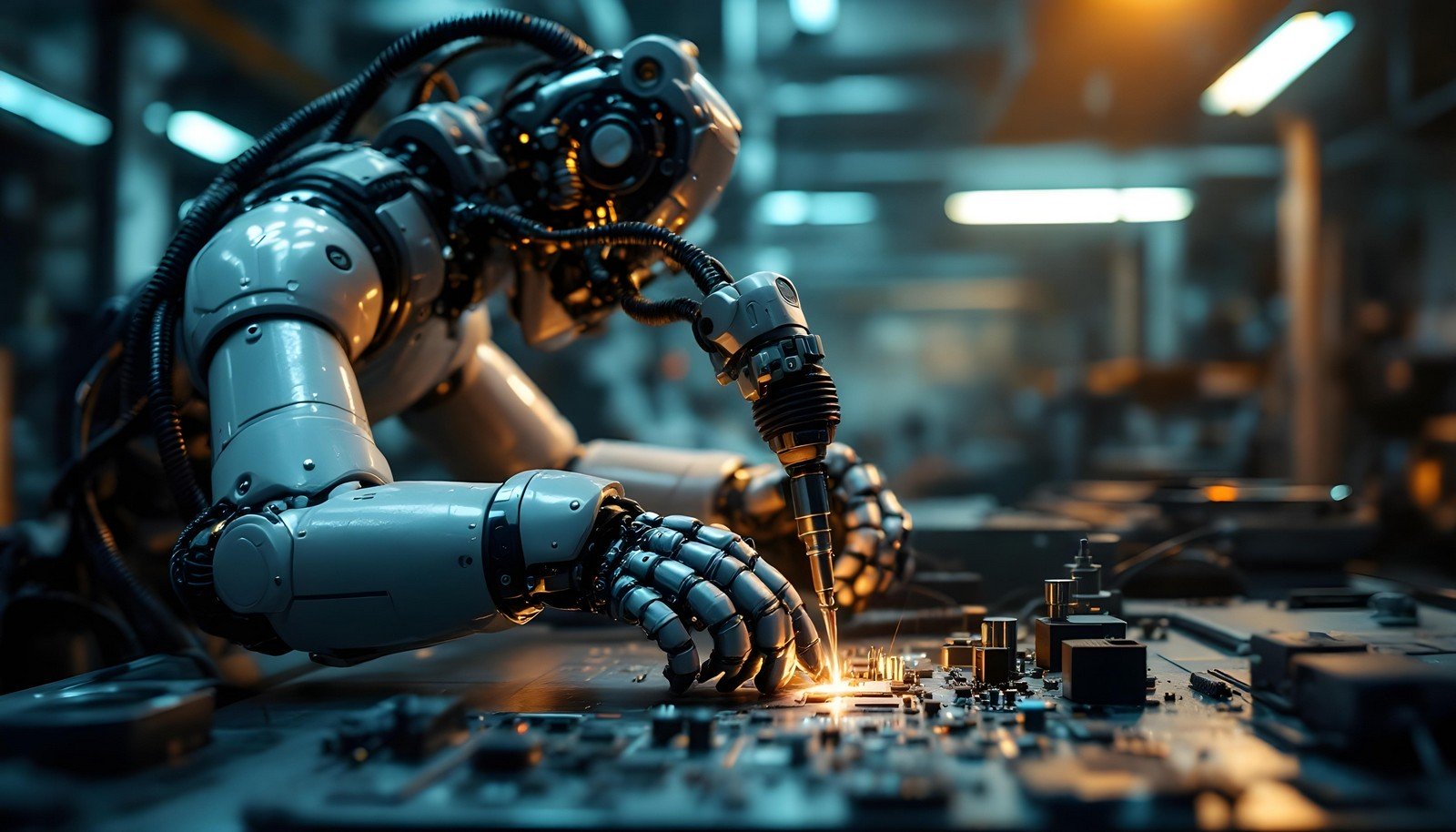Intelligent Automation (IA)

Quick Navigation:
- Intelligent Automation Definition
- Intelligent Automation Explained Easy
- Intelligent Automation Origin
- Intelligent Automation Etymology
- Intelligent Automation Usage Trends
- Intelligent Automation Usage
- Intelligent Automation Examples in Context
- Intelligent Automation FAQ
- Intelligent Automation Related Words
Intelligent Automation Definition
Intelligent Automation (IA) refers to the integration of advanced technologies like Artificial Intelligence (AI), Machine Learning (ML), and Robotic Process Automation (RPA) to streamline and enhance decision-making processes and workflows. It allows for automation beyond repetitive tasks, enabling systems to learn, adapt, and improve efficiency over time. With Intelligent Automation, businesses can analyze vast data sets, predict outcomes, and optimize operations in real-time, making it ideal for sectors like finance, healthcare, and logistics. It combines human-like cognition with automated processes, allowing systems to perform complex tasks, thus maximizing productivity and minimizing errors.
Intelligent Automation Explained Easy
Imagine a robot that not only follows instructions but also learns and makes decisions on its own! Intelligent Automation is like giving machines the ability to think and solve problems. So instead of doing the same thing repeatedly, these machines can understand the work, improve as they go, and make decisions when things change. For example, it could help in an online store by automatically adjusting prices based on what people are buying or deciding the quickest delivery route.
Intelligent Automation Origin
The origin of Intelligent Automation stems from the advancement in AI and computing power, particularly in the early 2000s. As companies sought more efficient processes, the rise of RPA and AI opened possibilities for automating complex tasks. By combining data processing with smart decision-making capabilities, Intelligent Automation emerged as a blend of AI and traditional automation technologies. Major strides came in the 2010s with cloud computing, which accelerated the ability to analyze data in real-time, leading to its adoption across industries.
Intelligent Automation Etymology
The term "Intelligent" traces back to Latin "intelligens" meaning discerning or understanding, while "Automation" originates from Greek "automatos," meaning self-moving or self-acting. Combined, the term captures the essence of self-operating processes with a level of discernment or learning.
Intelligent Automation Usage Trends
Intelligent Automation has seen a rapid increase in usage in industries prioritizing efficiency and data-driven decision-making, particularly in finance, healthcare, and logistics. Enterprises implement IA to streamline operations and reduce operational costs, especially in areas requiring predictive analytics or large-scale data processing. With the growth of digital transformation, IA adoption is expanding across small to medium businesses, enabling them to compete in an increasingly automated economy.
Intelligent Automation Usage
- Formal/Technical Tagging: Automation, Artificial Intelligence, Machine Learning, Workflow Optimization, Robotic Process Automation (RPA), Business Intelligence, Predictive Analytics
- Typical Collocations: Intelligent Automation platform, deploy Intelligent Automation, Intelligent Automation in finance, Intelligent Automation benefits, Intelligent Automation solution
Intelligent Automation Examples in Context
- “The banking sector relies on Intelligent Automation to quickly process loan applications, ensuring faster approvals and customer satisfaction.”
- “By using Intelligent Automation, healthcare providers can automatically update patient records and improve diagnostic accuracy.”
- “With Intelligent Automation, logistics companies optimize their delivery routes in real-time, cutting fuel costs and enhancing delivery times.”
Intelligent Automation FAQ
- What is Intelligent Automation?
Intelligent Automation is the use of AI and RPA technologies to automate complex processes and decision-making tasks. - How does Intelligent Automation work?
It combines AI, machine learning, and data analytics to process information, learn from it, and make decisions. - Where is Intelligent Automation used?
It’s used in industries like finance, healthcare, logistics, and retail to improve efficiency and decision-making. - What are the benefits of Intelligent Automation?
It improves productivity, reduces errors, and enables faster decision-making. - Can Intelligent Automation replace human jobs?
It automates repetitive tasks but also creates new opportunities for roles focused on oversight and innovation. - How is Intelligent Automation different from traditional automation?
Unlike traditional automation, IA can learn, adapt, and make data-based decisions. - What skills are needed to work in Intelligent Automation?
Knowledge of AI, data analytics, machine learning, and process automation tools is helpful. - How can businesses implement Intelligent Automation?
They can start by identifying repetitive tasks and then integrating IA tools like RPA software and AI platforms. - Is Intelligent Automation expensive to implement?
Costs vary, but it can often lead to long-term savings by increasing operational efficiency. - What are examples of Intelligent Automation tools?
Examples include UiPath, Blue Prism, and Automation Anywhere, which specialize in RPA and AI-driven automation.
Intelligent Automation Related Words
- Categories/Topics: Artificial Intelligence, Machine Learning, Data Science, Workflow Automation, Business Intelligence
- Word Families: Intelligence, Automate, Automation, Robotic, Process, Optimization
Did You Know?
Intelligent Automation played a pivotal role during the COVID-19 pandemic, where it helped organizations adapt to the challenges of remote work, supply chain disruptions, and a surge in digital services. For instance, IA enabled call centers to automate responses to common questions, helping manage increased customer inquiries while allowing human agents to focus on complex cases.
PicDictionary.com is an online dictionary in pictures. If you have questions or suggestions, please reach out to us on WhatsApp or Twitter.Authors | Arjun Vishnu | @ArjunAndVishnu

I am Vishnu. I like AI, Linux, Single Board Computers, and Cloud Computing. I create the web & video content, and I also write for popular websites.
My younger brother, Arjun handles image & video editing. Together, we run a YouTube Channel that's focused on reviewing gadgets and explaining technology.



Comments powered by CComment